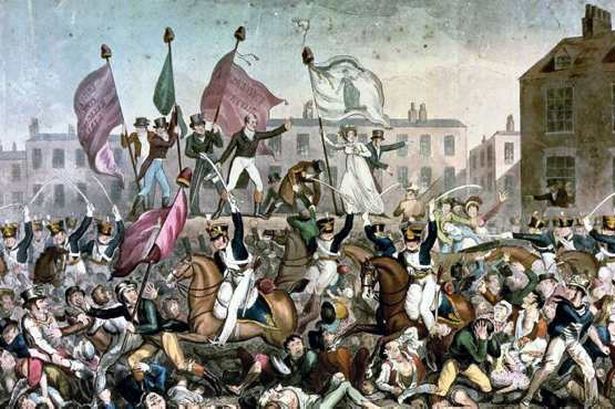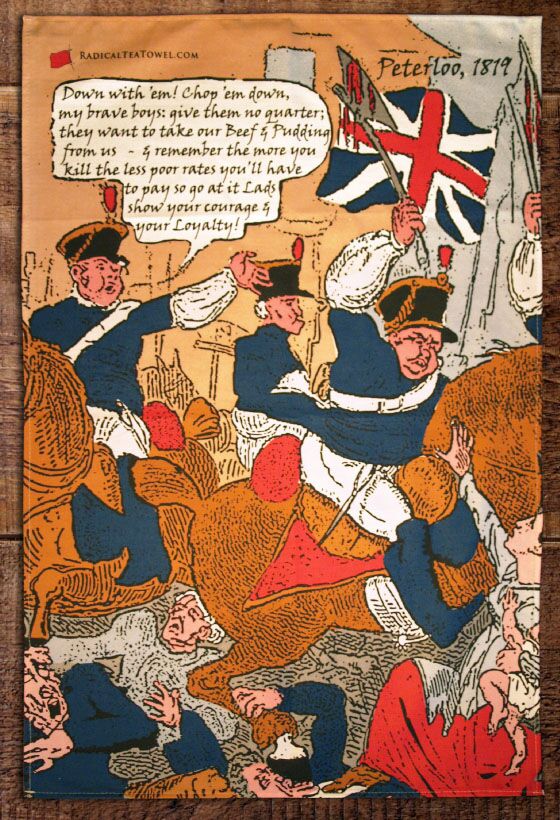Marching for Democracy: The Peterloo Massacre
Posted by Pete on 16th Aug 2019
200 years ago today, a march at St Peter's Field saw government soldiers attack a peaceful gathering of Mancunian workers, who were out demanding the right to vote. But the events that followed the Peterloo Massacre would show the powerful that this kind of repressive violence couldn’t and wouldn’t save them from democracy.
Radical History doesn’t get any more local for me than the Peterloo Massacre.
Not only am I a Mancunian, born and bred, but I’m also writing this email in a café barely 100 yards from where the events took place exactly 200 years ago today.

A march to demand democracy
Thanks to a much-needed surge in education around the bicentenary, the basic story of Peterloo is more widely known now than it was even just a few years ago.
On 16th August 1819, some 80,000 people gathered on St Peter’s Field in central Manchester to demand democratic representation.
Most of them were industrial workers from Manchester and its surroundings, impoverished by economic depression and left without any relief from the government.
They wanted the power to change things, so they came together to demand it – in a public, passionate, and peaceful way.
Under a rainbow of banners, lovingly stitched with slogans like “Universal Suffrage” and “Liberty and Fraternity”, they listened to radicals like Henry Hunt speak up for democratic reform.
That was until government cavalry – deployed to keep the ‘peace’ – charged the crowd, hacking with their swords as they went.
The massacre at St Peter's Field, remembered
It was class war at its most obvious – wealthy businessmen-turned-militia of the Manchester and Salford Yeomanry massacring defenceless workers from horseback.
By the time the dust had settled on Manchester, 14 people lay dead – the youngest was a two-year-old boy, William Fildes, thrown from his mother’s arms when she was run down by a cavalryman.
The incident was so shocking in its horror and brutality that it was given the name "Peterloo," after the notorious carnage at the Battle of Waterloo (which had taken place just four years earlier).
It’s great that the story of Peterloo is finally getting out to the public – Mike Leigh's Peterloo film is great if you haven't seen it – and reminding ordinary people in Britain of the sacrifices made for our modern democracy.

But it also carries a reminder for tyrants and would-be tyrants: repression and violence won’t save you.
Because that’s what the Peterloo Massacre was – not a drunken unit of Yeomanry ‘gone rogue’, but a considered crack of the government whip against the movement for democracy in Britain.
And what a failure it was.
Suppression after Peterloo wouldn't stop the tidal wave of democratic fever
Immediately after Peterloo, rallies swept the country in solidarity with the people of Manchester. Soon enough, in places like Burnley and Huddersfield, workers were attempting outright rebellion.
Utterly remorseless about Peterloo, the government doubled down.
Freedom of the press was seriously restricted and, by the end of 1820, almost every known working class radical in the country had been imprisoned for ‘sedition’ (always the favourite accusation of tyrants).
But, once again, repression proved in vain.
However many were silenced, shot, or sent to jail, more kept coming, demanding democracy.
Following the radicals of Peterloo into the breach went the Chartists, then the trade union movement, then the Suffragettes – each building on the last to carry forward a full-scale democratic revolution in this country.
Those who fell on St Peter’s Field 200 years ago today, just a few yards from where I’m sitting right now, lit a torch which has been taken up again and again by those seeking justice and representation in Britain.
No amount of violence or repression has been able to snuff this torch out – it’s still there, waiting to be carried onward into the next battle.
The struggle for real democracy in Britain – one which has been fought for centuries – continues in our time (it bears repeating that our current PM was elected by just 0.13% of the population).
But if the story of Peterloo tells us anything, it’s that the movement for a fairer and more just society has always been, and will always be, stronger than the privileged few who stand against it.
